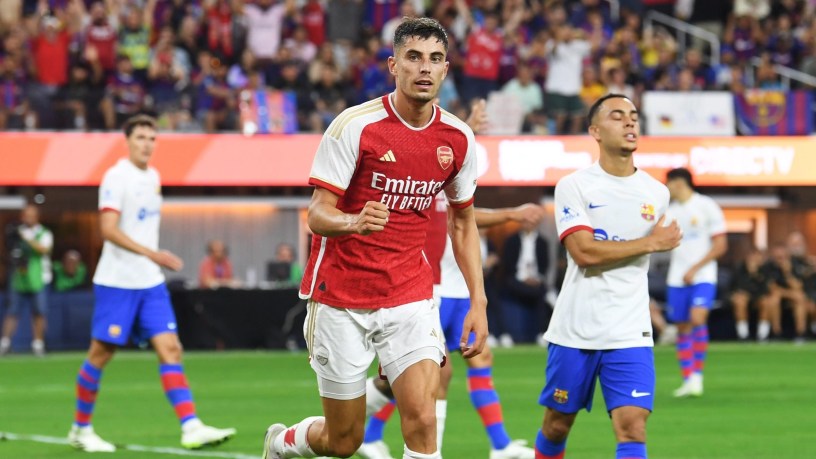Kai Havertz isn’t a striker.
Kai Havertz isn’t a midfielder.
In fact, it’s pretty difficult to peg down his best position. The only way to really understand how marvelous our recent recruit will be for Arsenal and Arteta’s grand plan is to examine his strengths.
Of which he has many.
Our acquisition of Havertz certainly raised a few eyebrows in the Arsenal fanbase. His time at Chelsea didn’t exactly match the fanfare and expectation that was present when the Blues made the signing back in 2020.
Because at Bayer Leverkusen, his previous club, he was labelled as the wunderkind of his generation.
Employed as an attacking midfielder with license to roam, Havertz bagged 61 goals and assists in 118 Bundesliga appearances. At such a tender age, it’s no wonder the world was sitting up and taking notice of this lanky kid who was terrorizing German defences.
And Chelsea stumped up the readies to employ his unique services.
And he is unique. His touch of the ball is velvet, but his finishing instincts aren’t quite at a striker’s level. He drifts in from out wide, but he doesn’t have the breakneck speed of a Saka or Martinelli.
But his burgeoning skillset wasn’t employed in the best way at Chelsea. The fact his numbers were so impressive at Leverkusen meant that Chelsea – and Tuchel, Lampard and Potter – used Havertz as a number 9 or at the very least a false 9.
Which undermines what Havertz does best.

He doesn’t lead the line, he bolsters it. His height is ideal for late bursts into the box – something Havertz and Arteta have been working on if his comments after our recent win over Barcelona is anything to go by. Havertz mentioned that his goal versus the Catalans (a late burst into the box at the back post) is something that he can harness in our coming campaigns to great effect.
Havertz’ work in and around the box matches Odegaard, Saka, Martinelli and Trossard. It’s intricate, it relies on vision and movement. Havertz is best when he can interlink with his teammates – which leans perfectly into Arteta’s gameplan. Attacking as a unit.
And Havertz will be required to track back too, which is well within his skillset as his stamina is up there with the best.
We needed the ability to switch things up a little last season when things got a little tough.
Havertz gives us that ability. So does Trossard. Versatility is a fantastic trait that Arteta treasures – our other recent recruit, Jurien Timber, is another fine exponent of the art of positional flexibility.
We can adapt in-game, dynamically. We can switch it up and keep opponents guessing. And we’re now armed to the teeth with skillful, versatile attackers who can burst into the box and change a game with the flick of a boot.
Havertz may have cost around £60m, but given time, there will be no one doubting the value of the transfer.
Havertz’s wunderkind tag back at Leverkusen was not just smoke – and he’s found the perfect coach and club to help his talent blossom and reach his potential.

